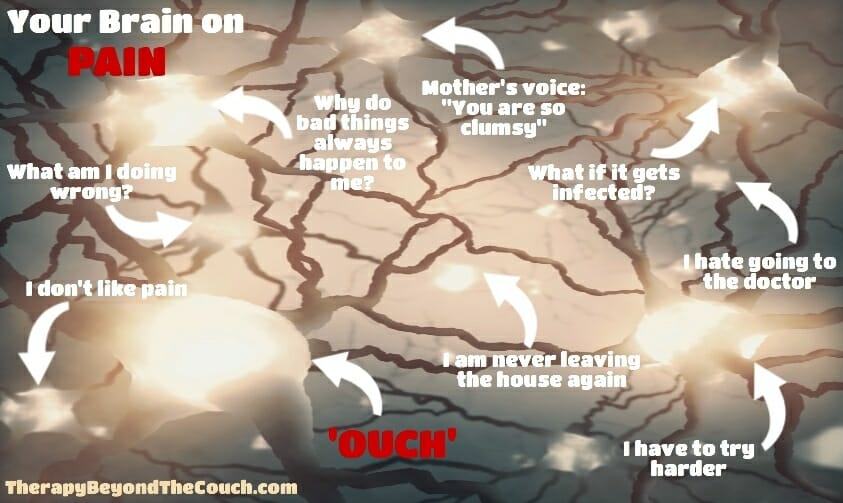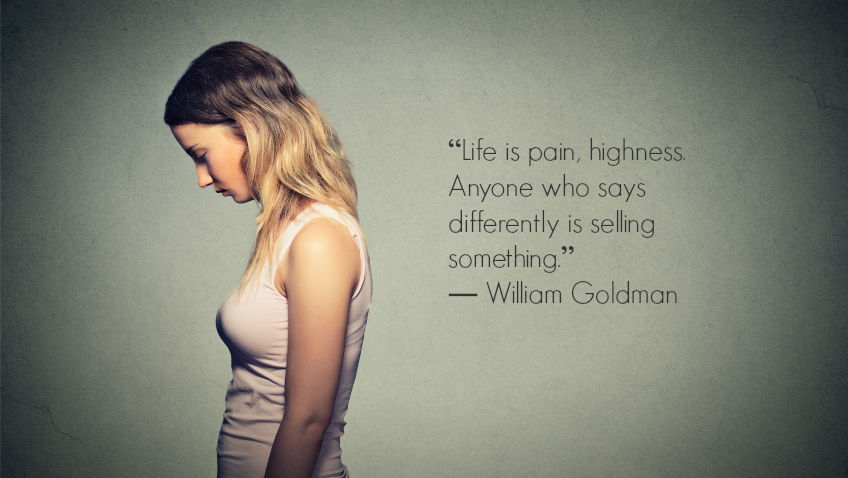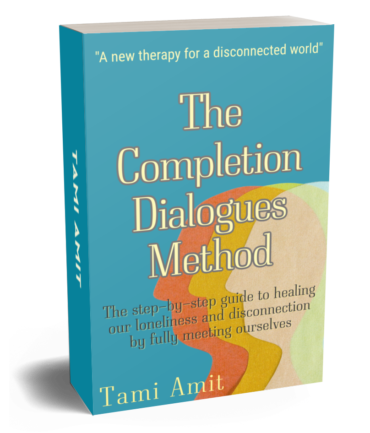On Being Imperfect (and other acts of courage)

You might see your imperfections as an unfortunate circumstance of your life – something you should rise beyond, overcome, or try to control. You might even see them as a personal failure, or a reminder that you need to work harder, longer, or better. But being IMPERFECT takes skill. It takes patience, practice and especially courage. Anyone can be perfect (or pretend to be), all it takes is hiding the parts of yourself that you don’t want people to see. People do it all the time – say what they don’t mean, and mean what they don’t say. But to be IMPERFECT you need to go deep into that closet of yours and hang out with all those bony skeletons, and then walk right out with a skeleton on each arm, willing to be honest with the world.
Pain and suffering are two separate things. Pain is the natural and inevitable part of the human experience, and suffering is the stories we choose to tell ourselves about the pain. Pain is – I stub my toe and say ‘OUCH’. Suffering is – I stub my toe and say “Damn I stubbed my toe again, why does it always happen to me? I’m so clumsy. What if it gets infected? Oh no…”. By the time we are done with that internal monologue, our negative experience of the pain has far surpassed the momentary ‘OUCH’.
We do this largely, to escape from experiencing the ‘OUCH’. As animals, we naturally avoid pain and seek pleasure, but what has kept us from becoming extinct all these years, has also become our downfall. In an effort to avoid feeling the sadness, fear, and anger that come with getting hurt, we deny, ignore, worry, play the ‘what if’ game, judge, compare, fight, and try to control the negative feelings. We tell ourselves stories about what the feeling means, and repeat old stories that have been told to us. If I feel this sadness then I am weak, we say. Or, If I give in to this exhaustion, then I am letting people down. We camouflage our real feelings with mind-chatter and in the process create suffering.
To be imperfect is to stay with the discomfort. It’s to see your vulnerability, and feel the fear that accompanies it. It’s to notice the instinct to run away and hide, and the compulsion to deny that there is anything wrong at all. It’s feeling anxious when speaking to a crowd but doing it anyway, and choosing not to change the subject when it gets uncomfortable. It’s putting yourself out there even though you feel scared, and refusing to smile when you don’t feel happy. It takes looking inside, seeing what’s there, and staying with it, and then staying a little bit longer, and then a little longer still. And even though you want to create great big stories about why and how and who – you don’t. It doesn’t mean you need to like your imperfections, but don’t hate them either. Know that you are them and they are you, and it’s neither good nor bad. It just is.
6 Steps Toward Imperfection:
- Make the choice to be courageous. Courage is not something you passively ‘have’, it is an active choice to be honest and open to whatever comes.
- Notice your avoidance techniques. Do you tend to analyze emotions? Or make a joke when things get real? Do you run away from relationships for fear of getting hurt? Or hide who you truly are to avoid being judged?
- Be willing to stay with the PAIN. Practice this skill by doing something TODAY that makes you uncomfortable (say I love you, I’m sorry, or I was wrong).
- Accept your imperfections. Accepting does not mean that you like them or that you’re glad to see them. It means that you are choosing to NOT run away from the painful thoughts and feelings.
- Live in line with who you really are. Say what you mean, and do what you believe in.
- Be imperfect even at being imperfect. Let yourself fail at this miserably, but once you do – accept it. Wait before you go into all the reasons of why you failed, and just for a moment – notice what it feels like inside. Stay with that feeling, and observe its PHYSICAL SENSATION – Is it heavy or light? Hot or cold? Rough or smooth? What colour does it have? What shape? After a moment or two of staying, and if there is any pain left at all, you can choose to add all the suffering you want.
Read more about Being Imperfect in Get Out of Your Mind and Into Your Life: The New Acceptance and Commitment Therapy by Steven Hayes, Ph.D
TAGS:
Sharing is Caring!
hello,
I'M TAMI!
I am a Psychotherapist, Clinical Hypnotherapist and EMDR Practitioner. If you want to create positive change in your life then you have come to the right place.
Now Trending:
Categories

Let's Work Together!
Other Posts of Interest
Get Your Hands
On My New Book
The Completion Dialogues Method: The new therapy for healing our loneliness and disconnection by repairing our most fundamental relationship – with our self! (to be released in 2022). See Full Details Here >

















